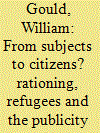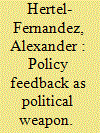| Srl | Item |
| 1 |
ID:
102040


|
|
|
|
|
| Publication |
2011.
|
| Summary/Abstract |
Building on recent work on the 'everyday state' and citizenship in 1947-1948, this paper examines changing practices and representations of 'corruption' in Uttar Pradesh, India over independence. The management and publicity of 'corruption', particularly in the food supply and rationing bureaucracy from the mid-1940s to the 1960s captures changing discussions about public expectations of government and narrates everyday urban experiences of the local state. Representations of administrative corruption within UP government 'anti-corruption' planning, around the late 1930s to early 1940s, reflected changing ideas about the public and citizenship in UP in general-from a colonial stress on administrative authoritarianism, where corruption was presented as a regrettable but unavoidable facet of local power, to a sense of public accountability. By the 1940s, with war-time commodity controls accompanying rapid political change, opportunities for nefarious gain widened, and administrative rules and functions quickly became much more complex. 'Corruption', as a symbolic political weapon, was publicized in a way which now connected national, state and local level discussions of independence, citizenship and state authority. Specifically, the very nature of different types of corruption in the crucial sphere of controls and rationing brought about more developed forms of political protection and backing for the corrupt administrator and encouraged new clientelist networks across the political spectrum.
|
|
|
|
|
|
|
|
|
|
|
|
|
|
|
|
| 2 |
ID:
159490


|
|
|
|
|
| Summary/Abstract |
Scholars have shown that once in place policies can foster greater political participation. Indeed, politicians often deliberately design policies to shore up political support among their allies. But can political actors engineer the reverse effect, crafting policies that demobilize their rivals? Drawing on the example of conservative cross-state advocacy against public sector unions, I describe the strategy of policy feedback as political weapon, or when actors design policies to politically weaken their opponents. I then document that the passage of conservative network-backed legislation led to large and enduring declines in public sector union density and revenue. I further show that by curbing the power of public unions, the passage of conservative network-backed bills dampened the political participation of public sector employees. My findings emphasize the importance of considering how actors use policy to demobilize political opponents and explain why public unions are now on the defensive in state politics.
|
|
|
|
|
|
|
|
|
|
|
|
|
|
|
|